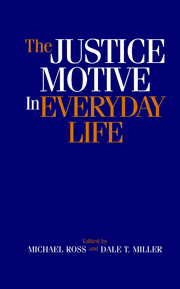Book contents
- Frontmatter
- Contents
- List of Contributors
- Introduction
- Theoretical Perspectives on the Justice Motive
- Victim Derogation and the Belief in a Just World
- The Justice Motive and Prosocial Behavior
- Justice-Based Reactions to Transgressors
- 16 Retributive Justive: Its Socical Context
- 17 Just Punishments: Research on Retributional Justice
- 18 Deservingness, Entitlement, and Reactions to Outcomes
- 19 Just World Processes in Demonizing
- Justice and Reaction to One's Own Fate
- Name Index
- Subject Index
19 - Just World Processes in Demonizing
Published online by Cambridge University Press: 08 September 2009
- Frontmatter
- Contents
- List of Contributors
- Introduction
- Theoretical Perspectives on the Justice Motive
- Victim Derogation and the Belief in a Just World
- The Justice Motive and Prosocial Behavior
- Justice-Based Reactions to Transgressors
- 16 Retributive Justive: Its Socical Context
- 17 Just Punishments: Research on Retributional Justice
- 18 Deservingness, Entitlement, and Reactions to Outcomes
- 19 Just World Processes in Demonizing
- Justice and Reaction to One's Own Fate
- Name Index
- Subject Index
Summary
There has been steady growth in recent years in psychologists' interest in phenomena that have long been the concern of moral philosophers, legal scholars, and theologians, including moral responsibility (e.g., Alicke, 2000; Weiner, 1995), moral emotions such as shame and guilt (e.g., Eisenberg, 2000; Tangney et al., 1996), moral hypocrisy (Batson et al., 1999), spirituality (e.g., Emmons, 1999), justice (e.g., Montada & Lerner, 1998; Tyler et al., 1997; Robinson & Darley, 1995), character and integrity (Sabini & Silver, 1998), destructive obedience (e.g., Blass, 1999; Darley, 1995; Kelman & Hamilton, 1989), forgiveness (e.g., Kelln & Ellard, 1998; McCullough, Worthington, & Rachal, 1997; Worthington, 1998), and evil (e.g., Baumeister, 1997; Darley, 1992; Staub, 1999). Our concern here is with evil and, more specifically, perceptions of evilness in the character of others. Against the background of ongoing discussions among social scientists about the meaningfulness of distinguishing evil acts from other acts, or even whether some people are truly “evil” (Baumeister, 1997; Berkowitz, 1999; Darley, 1992; Magid, 1988), we focus on the circumstances and individual propensities that give rise to character attributions of evilness – a process we call demonizing. Consistent with previous analyses by John Darley (1992) and more recently Roy Baumeister (1997) and Leonard Berkowitz (1999), our approach assumes that perceptions of evilness in the character of perpetrators is in some measure “in the eye of the beholder,” reflecting the perceiver's cognitive and motivational processes.
- Type
- Chapter
- Information
- The Justice Motive in Everyday Life , pp. 350 - 362Publisher: Cambridge University PressPrint publication year: 2002
- 22
- Cited by



